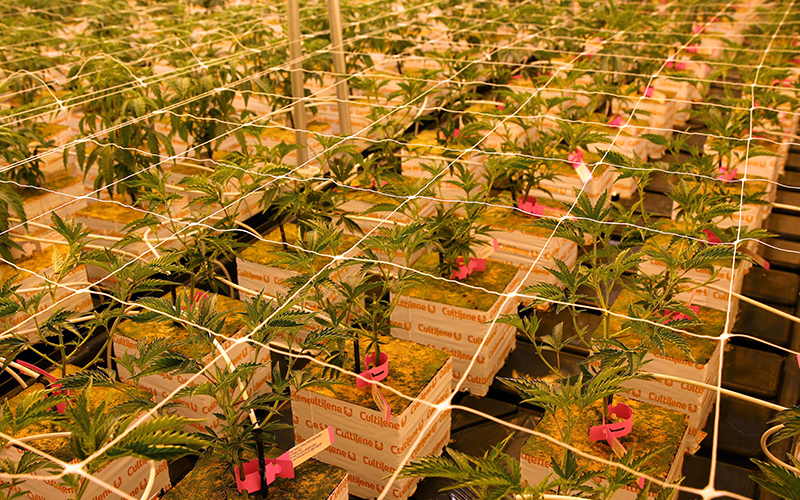With the election just days away, Cronkite News is taking a closer look at some of the measures on the Nov. 3 ballot.
Four years after Arizona voters rejected legalizing recreational marijuana, the issue is back, appearing on November’s ballot as Proposition 207.
Eleven states have legalized recreational marijuana. Arizona joins three others – Montana, New Jersey and South Dakota – with the question on the Nov. 3 ballot.
The Marijuana Legalization Initiative, also known as the Smart and Safe Arizona Act, would legally allow people 21 and older to possess up to 1 ounce of marijuana, although smoking it in public places and open spaces would be prohibited. Arizonans would be allowed to grow up to six plants in their personal residences, and anyone arrested for, charged with or convicted of less serious marijuana-related offenses would be allowed to petition to have their criminal records expunged beginning July 21, 2021. Those offenses include possession of 2.5 ounces of marijuana or less and possessing paraphernalia used to smoke marijuana.
“We took the Smoke-Free Arizona Act that was passed in 2007 and used that as a model” for the public smoking aspect, said Chad Campbell, a former Democratic state representative who’s chairman of Smart and Safe Arizona. “We really ended public smoking, (which) hasn’t been done in any other state.”
However, Lisa James, chairwoman of Arizonans for Health and Public Safety, and other critics contend the proposition would not completely ban marijuana usage in public.
“While the proposition says it would ban smoking in public places, it doesn’t say anything about consuming (THC, the psychoactive component of marijuana) via vaping or edibles in public,” she said.
Proposition 207 also would put the Arizona Department of Health Services in charge of developing regulations for businesses producing and selling marijuana. All sales would face a 16% surtax, which would fund community colleges, public safety, public health programs and infrastructure.
Many of the items outlined in the initiative are similar to those of Proposition 205, which failed in 2016 with 48.68% of the vote.
Smart and Safe Arizona, the group promoting the proposition, had raised $3.48 million as of July 18. Arizonans for Health and Public Safety, the main opposition campaign, had collected $142,065 in the same period.
Campbell said Proposition 207 will help solve two large problems plaguing the state for years: generating new revenue for underfunded sectors and decriminalizing the personal use of marijuana.
“This campaign is different from other campaigns in the past, in that we’ve spelled out where the money is going to go,” Campbell said. “We really spell out some of the safety and regulatory structures that won’t bandage the program.”
The Wild West scenario that opponents fear won’t occur, he said, because the regulations will prevent marijuana dispensaries from opening on every street corner.
Campbell said the license regulations in the bill would increase the number of licenses available in tandem with population growth. In addition, a number of licenses would be set aside for underserved communities.
Jared Keenan, president-elect of Arizona Attorneys for Criminal Justice, which supports Proposition 207, agreed with Campbell that legalizing marijuana will not lead to pandemonium with increased usage. The notion that “society is falling apart (and) cities are burning” where marijuana is legal is false, he said.
Some opponents also contend the proposition’s increased penalties for driving under the influence of marijuana are insufficient, based on studies showing increased cases of impaired driving in states where marijuana use is legal.
Keenan disputed the accuracy of those studies. Before legalization, in many places police did not track the cases of people driving while high. After legalization, though, law enforcement started tracking the number of cases more closely, he said, and the studies don’t indicate whether driving while high has increased or just the tracking of the behaviour.
James disagreed, contending that legalizing marijuana would make the roads less safe because it would weaken Arizona’s DUI laws and reduce penalties for users younger than 21.
“Ten years ago, they told us this is a powerful drug and that it should be a medication,” she said. “Now they’re saying. ‘Let’s use it recreationally, but only for people over the age of 21. But yet, we’re going to make it not terrible if you use it under 21.’ So there’s a lot of conflicting messages there.”
Arizona voters approved the use of marijuana for medical reasons in 2010, and the first dispensaries opened in 2012.
Campbell and James both urged Arizonans to read the 17-page document before voting.
Dr. Ed Gogek, a psychiatrist specializing in substance abuse and the author of “Marijuana Debunked,” said Proposition 207 will allow the for-profit marijuana industry to encourage teenage usage, much as tobacco companies did decades ago.
Using marijuana can permanently change a teen’s developing brain, leading to a poor attention span and weakened memory, he said.
“What turns a profit for these companies is appealing to teenagers, even if they have to say they’re not trying to do that,” Gogek said. “We know that in states that have legalized recreational use that they have the highest teenage use in the country.”
James also said the proposition would cap the amount of tax that can be tacked onto marijuana purchases, despite what expanded usage might cost the state. She cited a study from Colorado that showed for every dollar taken in from the marijuana tax, the state spent $4.50 on expenses related to marijuana use.
Dr. John Sutro, who assesses patients at Scottsdale Medical Marijuana Certification Center, said Arizona residents would pay more if they bypass the state’s medical marijuana option and purchase directly from recreational dispensaries. Recreational marijuana would be taxed at 16% in addition to state and local taxes of about 9%, which equals 25%, and the rate could increase with demand, he said. A medical card obtained through a doctor is valid for two years and costs $150. Medical marijuana sales are subject to state and city taxes.
Sutro also said medical cards also allow doctors to track patients’ consumption safely. The general perspective of medical marijuana doctors, in his opinion, is they want to see marijuana use regulated more than what Proposition 207 would establish because “sometimes (a doctor) wouldn’t want to prescribe the medical marijuana.” This is especially true for immunocompromised patients during the COVID-19 pandemic, he said, because smoking can compromise the immune system and lung function.
The inclusion of Proposition 207 on the Nov. 3 ballot could increase turnout by younger voters. Only 40% of Arizonans ages 18 to 24 voted in the 2016 general election.
 Want more on the 2020 elections? Cronkite News, Arizona PBS and Indian Country Today have teamed up to bring you comprehensive election coverage. Click here for more.
Want more on the 2020 elections? Cronkite News, Arizona PBS and Indian Country Today have teamed up to bring you comprehensive election coverage. Click here for more.
